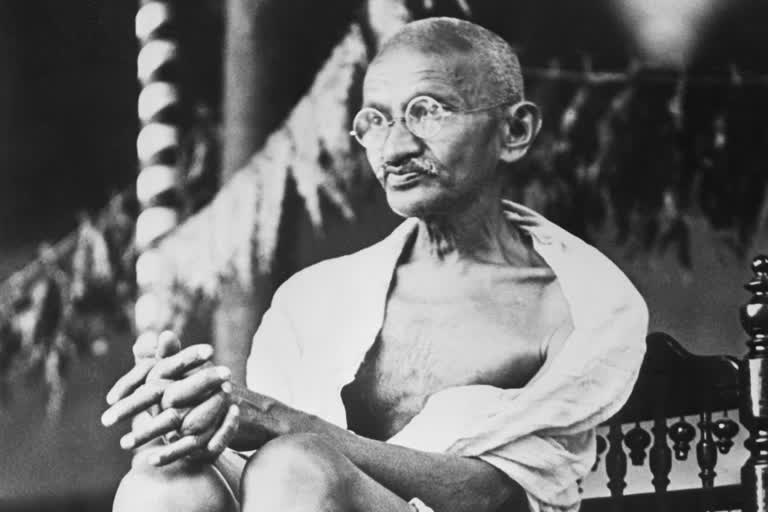Hyderabad: Gandhi's stellar role for the Indian freedom cause has led to many considering him the harbinger of the parliamentary democratic system that post-Independence India has embraced and assimilated as one of the essential entities of her sovereignty.
But, is the present form of parliamentary democracy the same that Gandhi had aimed for? Or, is parliamentary democracy a culmination or fruition of Gandhian doctrines, in a sense that we can proudly declare to have bequeathed it from the Father of the Nation?
Finding answers to these questions have become essential, especially now when India as a nation is about to complete seventy-five years of sovereign rule, a period of time that should be enough even for a complicated republic like India to establish her uniqueness and identity as a nation.
Parliamentary democracy is often considered to be the best available system that can accommodate differing opinions and ways of life, the establishment of an order as well as a critique of the order. It is on one hand a system that seems to be propelled by the support of the majority, and on the other, it looks to respect and recognise every minor experiment with life, the individual uniqueness of thought, and action.
It often stops the ruthless power game incessantly operating within the political system taking a violent turn causing bloodshed and civil war. If allowed to operate freely, parliamentary democracy paves way for the bloodless transition of power and establishment of common goals of a welfare state with economic development, social equality and justice, adherence to the constitution etc.
Unlike her neighbours, India has sustained a somewhat acceptable form of the system despite many hiccups. But, the system is not definitely without its share of glitches.
In his seminal work ‘Hind Swaraj’, Gandhi used two very strong words to lay bare the lacunae of parliamentary system extant in the then Britain. In fact, he never regretted using the sharp words that described the ineffectiveness of the British system.
He never considered Parliament or legislative houses to be the real agents of change. Any change of policy undertaken by the Parliament would not come into effect until it is substantiated with significant public support. So every social change, thus, is either mobilised by general consensus of the common people or brought into the limelight through sustained social revolutions by members of the conscious conscientious civil society. That is why Gandhi dubbed parliament as ineffective, without any real intent, sometimes even trying to delay the change, which is inevitable. The other epithet he used, shows his disillusionment with the parliamentary system, which can only play according to the whims of the ruling party and unabashedly goes about satisfying their ideological ego.
Despite the strong criticism, Gandhi had not completely rejected the system. Post Independence, he had not severed ties with those disciples of his who embraced the system. He had identified the limitations of the system but also understood that it was the only possible alternative.
Parliamentary democracy is not about pretending to be a gentleman allowing within its structure an underplay of unethical corrupt and coercive power game. Without the presence of a strong unified politically-conscious civil society, parliamentary democracy can neither mitigate corruption nor ensure basic rights of the citizens.
In the process of state formation, Gandhi considered individuals more important than the collective system. In his opinion, individuals together form the system and not the other way round. Unlike Machiavelli, Gandhi believed in the inherent goodness of humanity and wanted every independent individual citizen to be conscientious. The conscience would govern the thought and activities of individuals who would not go on doing repetitive tasks, but weigh and measure their actions on ethical scales. These individuals together would form a system that would eradicate inequality, injustice and corruption from the society.
This is why Gandhi never wanted to magnify the power or the role of the State. For him, people made the State and in a democracy, the State doesn't dictate terms to its people. He was for a system that safeguards as well as encourages individual freedom and is ripe for peaceful social change. Gandhi is, therefore, never really an advocate of parliamentary democracy where the process of social change is not always peaceful, nor is individual freedom prioritised over so-called State interests.
The type of societal system Gandhi craved for has its base in the villages. The village society Gandhi had strongly advocated, should be made the power centre and not the State, because even if the village society is constrained with superstitions, lack of education, poverty and other impediments, the ideas of cohabitation and camaraderie binds the society together and make them work for the common goal.
On the other hand, if power is State-centric, the focus shifts to taking control of the State. Here political parties vie only for attaining power even if that leads to disregarding the basic principles of democracy. Here party ideology gains supremacy over the ideals of social justice.
Though the power battle, in this case, happens around the Capital state, yet to win the battle, controlling the villages becomes significant. So, the upper-class urban political slugfest reaches the village and destroys the camaraderie and fellow-feeling of the village society. Gandhi had sensed this and therefore, used strong words against the city-based parliamentary democratic system. He had even asked for disbanding of the Congress after the Independence and had instructed Congress workers to go to villages not as representatives of the Congress party, but as ‘loksevaks’, servants of the people.
Gandhi reiterates that the epicentre of the system would be the village society, which should be freed from the contamination of electoral politics. Here Gandhi steps ahead of the parliamentary democratic system, leaving a roadmap for an ideal future society. Politicians of today may find it impossible, but according to Gandhi, here lies our redemption.
Read: Gandhi's Buxar chapter eventually transformed him into the Mahatma



